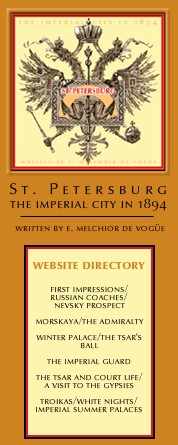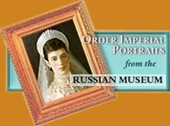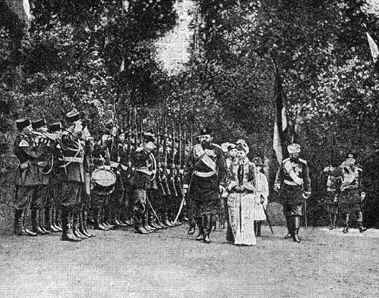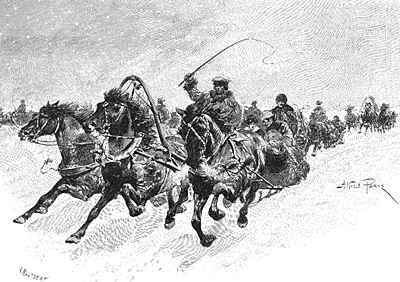


 | 
COURT LIFE AND A VISIT TO THE GYPSIES
We have lingered long with the Court and the Army, but it was necessary to do so to accentuate the preponderant position they occupy in life at St. Petersburg. This life seems to have lost its object when the Czar retires with his family to the solitude of Gatchina, which is a kind of Russian Escorial, a dark and gloomy castle hidden in a pine forest, a few leagues from the capital. There the Imperial couple lead a quiet regular life, devoted entirely to the education of their children and the conduct of business.

A Review at Peterhof To find again the society we made acquaintance with in the Winter Palace, we must obtain an entree into the best mansions on the Court and English quays. In them, as in the lodging of the humblest functionary, there is none of the feverish haste so characteristic of other great capitals. No one at St. Petersburg is pressed for time. Every one, like the winter sun, gets up late, and traffic does not begin in the streets before ten o'clock in the morning, at which time shopkeepers have not yet taken down their shutters. Directly after breakfast one goes out in a sledge for a drive on the Palace Quay or the Neva Perspective, and already the daylight is beginning to wane. One visit now succeeds another until dinner-time, and people go from house to house to talk over the news, generally Court news, which has been issued in the morning in the St. Petersburg journal, or more private information which has been dropped from the lips of some official of high position. Lately all fashionable people with any self-respect have passed the early part of the evening at a fashionable theatre-now at the Italian Opera, where Patti or Christine Nilsson perform their most wonderful roulades; now at the Michael Theatre, where the best actors of Paris act their comedies. At the present day the Russian theatre, long deserted by the upper classes, is regaining favor. The opening of the present reign gave the signal for a return to national life, and it is now quite the thing to go and applaud the plays of Griboiedov, Gogol, and Ostrowsky, interpreted by Madame Savina, the star of Russian dramatic art.
On leaving the theatre, every one goes to the drawing-rooms open to him. Evening parties begin very late. On arriving, at eleven o'clock, at the house to which you are invited, it is no uncommon thing to hear that your hostess is not yet dressed; she has been lying down since dinner for the sake of her complexion. To make up for this, some hospitable doors are open till past two o'clock in the morning. No one will be surprised to see you, and a cover will be set for you at supper, the favorite meal of the Russians. Whether by rich or poor, a supper is always served to intimate friends, and no one goes to bed in St. Petersburg before three o'clock in projecting against the pavement under the snow, or bumps over a mass of ice on some arm of the Neva, the passengers are all but thrown out. But the intoxication produced by the intense cold and rapid motion is at its height, and cries are heard of "Onward! Faster! Faster!" echoed in the trembling voices of the women, while perhaps a grave voice whispers: "Why faster? Would that we might never end this journey!"

"Faster! Faster" But the journey does come to an end. The team, white with foam and ice, stops at an isolated tavern. It is Samarkand or Tashkent, one of the outlying inns of St. Petersburg, famous for the number of Bohemians who put up at it. The visitors engage an anything but luxurious room - four smoky walls, a few chairs, and table; that is all. Champagne is ordered, and with it appear the Tsiganes: four men, perhaps, and from eight to ten women, who will sing something. The men, with their swarthy faces, eagle-like profiles, and large, deep-set, sad-looking eyes, have all the quiet dignity of their race, and might be dispossessed Asiatic monarchs. One would gladly describe the women as clad in picturesque Oriental costumes, but, alas! truth compels me to add that they wear ragged silks, the cast-off finery of some fashionable dame, bought at a second-hand shop in the Gostiny Dvor.* The olive tint, showing through the paint on the cheeks, and the fire of the pupils of the eyes beneath the stained lashes, alone reveal the Hindu origin of these pariah girls. The leader of the band tunes his guitar and strikes up an accompaniment, at first very slow, but gradually increasing in rapidity, and the women, seated in a semicircle, with bodies and faces motionless, sing together. They, too, begin slowly, and with apparent indifference to the sentiments they are expressing, looking like Sibyls possessed by a god of which they are unconscious. But gradually the voices become more animated and passionate, until with a guttural shake, such as can never be imitated by any other race, the demon seems to overcome the singers; they quicken the rhythm with a kind of furious ardor, abrupt pauses alternating with words and melodies, all breathing the same exaltation, the languors, the despairs, and ardors of a savage passion. In these melodies is concentrated all the madness, all the melancholy, of the spirit of the ancient Aryans.
And this spirit finds an echo in the soul of the Slav. Watch those patrician ladies listening to the daughters of Bohemia. In spite of all the differences of education and social position, they are the true sisters of the Tsiganes. Beneath their apparent disdainful reserve, they vibrate in unison with the same natural passion, and would remain here all night magnetized by these airs of their true native land. The men make no attempt to disguise their delight, and a Russian would spend his last ruble to purchase a pleasure he values above every other. Some monomaniacs come here evening after evening, spending their nights listening to these songs, glued to this table by a tyranny as irresistible as that under which is subject the smoker of opium. Most of the officers of the Guard are on a very friendly footing with the Bohemian women. To-night the presence of ladies holds them in check, but when they are alone, champagne flows like water, and the strings of the purses are unloosed. Sometimes a scuffle occurs with merchants, who get tired of waiting for the room, and intrude on the officers and the singers. They, too, like to hear the music; they, too, are willing to pay for the pleasure. For all this, however, no doubt must be thrown upon the virtue of the Tsigane women. They are as celebrated for this as for their charms; and even if they themselves were open to temptation, their men would jealously protect them from harm. Many a beautiful Tsigane may end her career by marrying a general, and bringing up his family in the seclusion of the country where her husband commands a district.
Though the inns frequented by the Tsiganes are the usual resort of the aristocracy of St. Petersburg, there is yet another excursion often undertaken, and that is to the Pulkova Observatory, half-way between St. Petersburg and Tsarskoe-Selo, on a little pine-clad hill, the one prominent height of the low marshy districts surrounding the capital. There lives a little German colony; for the Germans superintend the affairs of heaven in Russia. Nearly all the astronomers of Pulkova come from the Dorpat University in Kronstadt, and are very jeal ous of their celestial office. On entering Pulkova one is transported into another world, and one might fancy ones self in some institution of Gūttingen or Jena. Wrapt up in the mysteries of space and time, these modest professors work under the direction of their chief, leading a kind of patriarchal life-an honest German existence, as subject to rule as are the motions of the heavenly bodies. Strangers to the excitements and rumors that trouble the great city, and to the interests and passions of the people about them, the horizon of the astronomers is bounded by their pine woods, with the huts protecting their household goods and books. They watch no revolutions but those in the firmament of heaven. Their journals are the almanacs of the sun and of the planets; their conversation alternates between the theories of Kepler and the excellent recipes owned by the wife of their chief for smoking geese-quaint combination of simple domestic interests and the great secrets of eternity. It is in the winter that the sphere of the astronomers becomes alike wider and more isolated, during the long nights of sixteen hours, so favorable for the study of the heavens. The recluses of science go up into their glass palace-wrapped in warm furs and with fur caps on their heads, like the astrologers of old. The venerable savants take their pupils to the top of the tower in the vast revolving rotunda turning upon its own axis, which looks like the poop of a vessel, with its mast, its rigging, its polished copper instruments, and its ports, in which the telescopes are pointed. The lamplight falls on open books, the compass flies to and fro on the maps, the telescope searchingly sweeps the polar sky, calculations affecting centuries of time are made, and the observers add a page to the annals of the heavens. At this solemn hour of silence, raised above the noises and illusions of the earth, these men are true masters of the universe; they can foresee its destinies; they know whence it comes, whither it is going, and what it weighs. Grave of mien, and proud of their responsibility, as are their brothers on the ocean in the watches of the night, they keep guard for the whole human race, and mark the course of our planet in unknown space among the formidable fleet of which she is a part. When some benighted traveller passes perchance through the solitudes about Pulkova, and sees the lights of the Observatory gleaming through the darkness, and its dome revolving in the night sky, he wonders if it be not some fantastic vessel lost in the sea of snow ; or, perhaps, if he be of a religious turn of mind, the wanderer may think he sees a party of worshippers assembled in their oratory to perform their orisons, and chant by night the praises of their God and Saviour.
Send your comments on this website to Bob AtchisonVisit other Pallasart Sites on Imperial Russia: Alexander Palace Time Machine | My Name is Anastasia | Nicholas and Alexandra Exhibition | The Life and Tragedy of Alexandra Feodorovna | Pavlovsk Palace | Yelagin Palace | Tsarskoe Selo | Russian Imperial Eggs | Russian Imperial Style | Dining with the Tsars | Gatchina Palace © 1998, 1999 Bob Atchison | Website built by Pallasart Web Design
|







